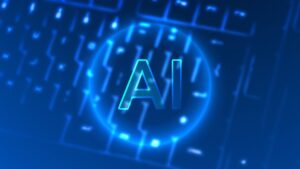Step into 2040’s world of work with Kristina Gerwert, Member of the Board at adesso SE, as she explores four vivid scenarios shaping the future. Amidst the uncertainty, one thing is clear: companies must prioritize meaningful work aligned with their culture and values. Welcome to the future of work.
The future of work changed at a stroke on 30 November 2022, when the Californian AI start-up Open AI made the first GPT model for its chatbot public. Suddenly, artificial intelligence was a reality that could be used by everyone and has fuelled horror scenarios ever since: will machines soon take over our jobs? The truth is much more complex – and much more positive.
And yet the release of ChatGPT is an important symbol: The fourth industrial revolution is in full swing, perhaps even more disruptive than the invention of the steam engine, the discovery of electricity and the first computers. Every revolution to date has seen a renegotiation of how people organise their work and how they live together. Now for Work 4.0.
Anyone who asks ChatGPT about the future of work will not be surprised: the most important factors are digitalisation and automation through AI and robotics. Production cycles, value chains and business models are changing as a result of digitalisation, and with them the organisation of work and its culture. The coronavirus pandemic has shown that many things can change surprisingly quickly.
Towards Tomorrow: Four Scientifically Modeled Scenarios for 2040
The Digital Working Society think tank of the German Federal Ministry of Labour and Social Affairs has systemised the vision of the future of work and developed four scenarios: What could work look like in 2040? A multi-layered foresight process was initiated for this purpose. Methodologically, existing ideas, assessments and visions of the future were analysed in science, organisations and society.
The results were compared with scientific projections, for example on demographic change, the potential of the skilled labour pool and the effects of climate change. The different weighting of key factors has led to the following visions of the future: the smart machine society, the platform society, the world of network capitalism and the resource-efficient society.
These are not predictions. No one is assuming that one design will have prevailed in its pure form by 2040. But these carefully outlined scenarios invite not only politicians, but also companies, to take a timely look at what lies ahead. Key design issues can be identified and strategic solutions developed. If the current trend in the labour market is projected into the future, only those companies that have successively adapted to the growing demands will be attractive to skilled workers.

Scenario 1 – Smart machines determine everyday working life. The population decline and the resulting lack of skilled labour have been compensated for by automation, and the consequences of climate change are combated by technological progress. Thanks to the widespread use of AI, efficiency has become a central value in all areas of the performance-oriented society.
Artificial intelligence is the key
A fictitious consequence of this scenario could be a new flexibilisation of work and leisure time and fewer hours in the working week. Job profiles will become much more interesting and complex as monotonous routine tasks are taken over by artificial intelligence. AI is the key to the emergence of a smart machine society. AI-generated training courses will train employees according to actual needs, knowledge sources will be made available to everyone and teams will be able to work together seamlessly on a global scale. Projects will be staffed much more skill-based – for better results and happier employees.
And to dispel the horror scenario once and for all: AI will take on more and more tasks in the future, but not jobs. Open AI founder Sam Altman commented: “I believe that there will be far greater jobs on the other side of this and that the jobs of today will be better.”
Scenario 2 – Platforms have established themselves as a form of business and economic services are sold via digital markets. Business models are often data-driven. And flexible project management has become the dominant form of value creation – with the aim of increasing productivity. Task, time and project work based on New Work principles are fighting against the shrinking population and the shortage of skilled labour. Society is becoming more and more individualised, the pressure to perform is increasing and specialists are in demand like never before.
New Work: agile working in times of digitalisation and globalisation
The social component has changed primarily as a result of New Work and agile working. Mobile working is the norm. But when people come together in the office, the workplace becomes a place of collaboration and is consciously used for social interaction. Freedom, independence, taking responsibility and participation in the community – in a project context, everyone must be well coordinated and cultivate a common spirit in order to be successful with these values.
Scenario 3 – Network captailism fuels digital companies as their own ecosystems with far-reaching networks in which many central tasks of life organisation, such as education, provision and leisure, are absorbed. Large internet companies as central drivers of innovation have data sovereignty, take over research and many tasks of the weakening state. People who remain outside of these ecosystems are at risk of slipping down the social ladder.
The most important challenge for individuals is therefore to acquire and develop crucial future skills – and this applies to each of the four scenarios. Lifelong digital learning and the resilience to withstand stressful situations without damage are key skills for remaining adaptable and surviving change processes with confidence or even helping to shape them.

Scenario 4 – In the resource-efficient society, sustainable management has top priority and digitalisation is a key driver for this. Regulatory requirements to mitigate the dramatic effects of climate change characterise the economy and society. The decarbonisation of industry leads to painful losses in welfare, but also strengthens social cohesion and a sense of unity. Structural change can create new jobs, but resource inefficiencies will be systematically reduced.
The future of work: thought-provoking impulses for consistent change
Whichever of the scenarios we may recognise in 2040, companies will not be able to avoid making some important adjustments: offering meaningful work and linking it closely to the culture and values of the company, to its purpose. Only then can employees be provided with the necessary freedom to fulfil their potential without losing sight of the company’s purpose. No matter how high the level of automation will be in around 15 years’ time, every single one of the many daily decisions – by people and machines – must contribute to the common goal.
The think tank’s four scenarios provide important impetus for consciously shaping change. It is not only employees who need to adapt to change as the new normal and cultivate resilience within themselves. Companies should also be well prepared for exogenous shocks, as the outbreak of a pandemic and a war in the centre of Europe have just shown.
Overall social, technological and climate-related developments will shape the labour market, resulting in dynamic adjustments. Education, flexibility, mobility and connectivity are key success factors. We face unprecedented opportunities for meaningful, fulfilling work, but also the challenge of embracing and shaping change in order to – figuratively speaking – survive. And evolutionary researcher Charles Darwin already knew this over 150 years ago: “It is not the strongest species that survives, nor the most intelligent, but the one that responds best to change.”
Link to the PDF of the think tank’s very differentiated scenarios (only in German).
Kristina Gerwert has been a member of the Executive Board of adesso since July 1, 2023, where she is primarily responsible for Human Resources, as well as for a subsidiary in the insurance segment and for the Corporate Buildings division. Gerwert's appointment to the Executive Board of the internationally expanding company underlines the importance of employee development - for the sustainable future viability of adesso. The graduate economist joined adesso in 2001 and was Head of Human Resources for a long time.






